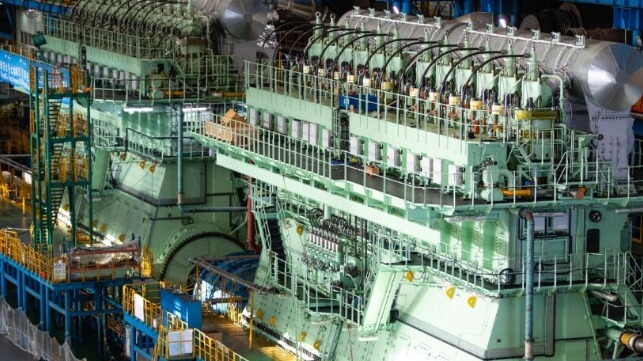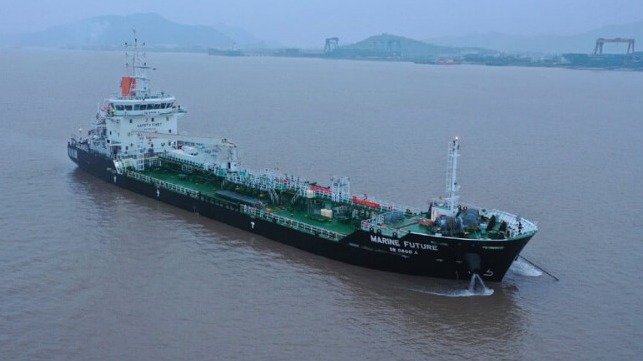ALTERNATE FUELS
WinGD and Mitsubishi Shipbuilding Agree Ammonia Fuel Supply System Design

Engine manufacturer WinGD and Mitsubishi Shipbuilding report they have reached a key milestone in the development of ammonia-fueled propulsion. The two companies have finalized the basic design for an ammonia fuel supply system for an ammonia-fueled large, low-speed two-stroke marine engine.
Mitsubishi Shipbuilding and WinGD concluded a Memorandum of Understanding in June 2023 to undertake technical studies on an ammonia fuel supply system. Under the partnership, WinGD is working to develop X?DF?A engines at appropriate sizes for a range of vessel designs, providing the shipbuilder with the specifications for installing the engines and the requirements for all auxiliary fuel systems. Mitsubishi is designing the vessels, setting performance parameters for the engines, and further developing its existing ammonia fuel supply system (AFSS) for use with WinGD’s ammonia engines.
The AFSS design is the first result of the wide-ranging partnership focusing on developing solutions for ammonia engines and fuel systems that can be applied across a range of vessel designs. Because ammonia emits no CO2 when combusted it is viewed as a leading alternative marine fuel as well as for heavy industry, but it also presents challenges to achieve and maintain steady combustion as well as the highly toxic and corrosive nature of ammonia.
As well as the fuel supply system - including a fuel valve unit, fuel conditioning, and all related piping – the companies report their concept includes several features to enable the safe use of ammonia as a marine fuel. These include an ammonia catching system as well as purging and venting arrangements.
“At present, our primary focus is on advancing the technology of our clean-fuel solutions including our ammonia-powered X?DF?A engines, with the first delivery expected in Q2 2025,” said Sebastian Hensel, Director R&D at WinGD. “This collaboration will make sure that the auxiliary systems and integration capability are in place to apply our engine designs, and developing the fuel supply system concept is a crucial step in bringing ammonia fuel capability to the marine market.”
The project will now proceed to the detailed design phase, ensuring that ammonia capability is available to ocean going vessel operators ahead of regulatory requirements to reduce greenhouse gas emissions.
In September 2023, WinGD reported that it had received approval in principle for the first of its ammonia two-stroke engines from Lloyd’s Register, the first ever awarded for two-stroke engines fueled with ammonia. They reported the engines will operate according to the Diesel principle in both diesel and ammonia modes, and Win has already recorded the first future delivery orders for ammonia-ready vessels.
Vitol Introduces Dedicated Biofuel Bunker Barge in Singapore to Meet Demand

Asia’s market for biofuels is expanding rapidly and to take advantage of the emerging opportunities, Vitol, one of Singapore’s leading fuel suppliers has taken delivery of its first specialized bunker vessel. The company looks to take advantage of the emerging opportunity and last fall reported the first vessel would be the first of several specialized bunker barges placed into service.
“Though at a nascent stage, demand for biofuel is expected to grow significantly in the coming years, as the shipping industry looks at ways to decarbonize and curb emissions,” says Vitol. They point to the International Maritime Organization’s interim regulations released last October as another factor likely in the near term to spur growth in biofuels.
“Biofuels are a key pathway for the hard-to-abate shipping sector to mitigate emissions,” the company notes.
As a result, the Maritime and Port Authority of Singapore which controls the bunker market, reported that last year sales of biofuel increased by nearly four times. They reported biofuel sales in Singapore reached 520,000 tons in 2023 up from just 140,000 tons in 20222.
Vitol recently introduced the Marine Future, a nearly 335-foot (102-meter) bunker vessel in Singapore. The vessel was specifically designed for the biofuel sector and built in China. It has the capacity to carry about 7,000 MT of biofuels and in the future can also be re-configured to supply methanol.
It is the first bunker tanker in Singapore to have the appropriate design and designation to deliver 100 percent bio-component fuels. The previous vessels in the market are all oil tankers, and Vitol points out that regulations restrict them to a maximum of 25 percent biofuel component in biofuel blends.
Through its V-Bunkers operation, the company already operates more than 20 bunker barges based in Singapore. They anticipate the new vessel will contribute to the continuing rapid growth in biofuel sales. Starting with the Marine Future, Vitol can offer a range of biofuel blends.
No comments:
Post a Comment